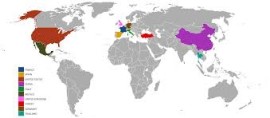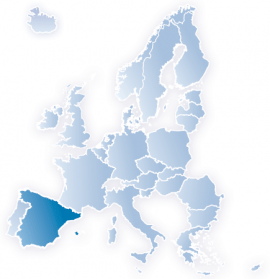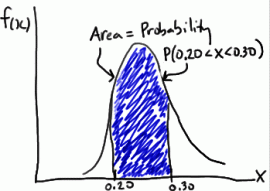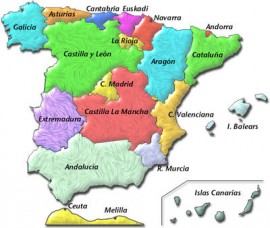- Fecha(s): 07/11/2019
- Lugar: Seminario del Departamento de Métodos Cuantitativos para la Economía y Empresa, UMU.
- Ponente: Gabriel Brida. Universidad de la Republica (Uruguay)

Abstract: In this paper we study the dynamics of economic growth and tourism evolution for 97 countries during the period 1995-2016. The variables representing economic and tourism growth are growth rates of per capita GDP and international tourism arrivals. Using the concept of economic regime, we introduce a notion of distance between the dynamical paths…
- Fecha(s): 13/06/2019
- Lugar: Seminario del Departamento de Métodos Cuantitativos para la Economía y Empresa, UMU. Retransmisión en directo.
- Ponente: Danilo Leiva-León. Banco de España

Abstract: This paper investigates the dynamics, propagation and drivers of macroeconomic volatility from a global perspective. A hierarchical volatility factor model is designed to estimate and decompose the time-varying volatility of output growth across countries into global, regional, and idiosyncratic components. We find that the global volatility component has been systematically declining over time, which is…
- Fecha(s): 24/05/2018
- Lugar: Seminario del Departamento de Métodos Cuantitativos para la Economía y Empresa, UMU. Retransmisión en directo.
- Ponente: Juan Luis Eugenio-Martin. Universidad de las Palmas de Gran Canaria

Abstract El desarrollo del sector turístico ha evidenciado su relevancia a nivel agregado en términos de valor añadido y empleo generado. Sin embargo, la mayoría de los proyectos y políticas turísticas parten de una iniciativa local. La evaluación de su éxito requiere de un análisis local o regional que requiere del entendimiento del comportamiento de…
- Fecha(s): 27/04/2018
- Lugar: Seminario del Departamento de Métodos Cuantitativos para la Economía y Empresa, UMU. Retransmisión en directo y grabación.
- Ponente: Jesús Vázquez. Universidad del País Vasco

ABSTRACT: Adaptive learning (AL) takes over other features needed to generate a sizable term premium under rational expectations. Indeed, a time-varying term premium emerges in a first-order approximation of a DSGE model under AL. We estimate a real-time AL model that builds on Slobodyan and Wouters (2012a). Our extension disentangles the expectations hypothesis of the term structure (EH)…
- Fecha(s): 01/03/2018
- Lugar: Seminario del Departamento de Métodos Cuantitativos para la Economía y Empresa, UMU. Retransmisión en directo.
- Ponente: Konstantin Kholodilin. German Institute for Economic Research (Berlin)

The homeownership plays an important role in the wealth accumulation, given that the real estate represents over the half of the private households’ wealth. For more than a century, the governments in the market economies have striven to maximize the proportion of households who occupy their own dwellings. The homeowners are thought to be better…
- Fecha(s): 16/06/2017
- Lugar: Seminario del Departamento de Métodos Cuantitativos para la Economía y Empresa, UMU. Retransmisión en directo.
- Ponente: Germán López. Universidad Católica de San Antonio Murcia
Abstract This paper studies the evolution of the monetary policy transmission mechanisms in the US after the financial crisis and the extraordinary monetary stimulus applied since 2008. The implementation of a modified Dynamic Factor Model allows the identification of two different structural scenarios based on the information contained in a large dataset of 110 variables….
- Fecha(s): 05/05/2016
- Lugar: Seminario del Departamento de Métodos Cuantitativos para la Economía y Empresa, UMU. Retransmisión en directo .
- Ponente: Mohammed Dore. Brock University.

We consider quarterly data of the Spanish economy from 1987 to 2013 to establish causal interconnections in a model free manner, using symbolic dynamics and permutation entropy (PE) and establish the exogeneity of adoption of the Euro (in Jan 1999) as the governing mechanism that leads to the key causal impacts on (1) interest rates,…
- Fecha(s): 30/10/2015
- Lugar: Seminario del Departamento de Métodos Cuantitativos para la Economía y Empresa, UMU. Se retransmitirá en directo.
- Ponente: María Isabel González-Martínez, Universidad de Murcia

Abstract Following the ideas of the Tourism Area Life Cycle (TALC) theory, we propose a dynamic econometric model for tourism demand where the reputation effect (the effect of the lagged demand on the current tourism demand) is not constant, but dependent on congestion. We test the model using panel data from Spanish regions during the…
- Fecha(s): 05/03/2015
- Lugar: Seminario del Departamento de Métodos Cuantitativos para la Economía y Empresa, UMU. Se retransmitirá en directo.
- Ponente: Trino Manuel Ñíguez Grau, University of Westminster

Abstract This paper introduces a novel semi-nonparametric (SNP) distribution that we name Expansion of Moments (ME hereafter). The innovation of this density lies in its polynomials given by the difference between the n-th power of the variable and the n-th moment of the parametric density used as basis. We show that the ME keeps the…
- Fecha(s): 29/01/2015
- Lugar: Seminario del Departamento de Métodos Cuantitativos para la Economía y Empresa, UMU. Se retransmitirá en directo.
- Ponente: Angel de la Fuente, Fedea

Abstract En este trabajo se presenta una metodología para la construcción de un Sistema de Cuentas Públicas Territorializadas (SCPT) elaborado desde la óptica carga-beneficio, así como una aplicación de esta metodología al caso del año 2011. El SCPT ofrece una radiografía detallada de la distribución regional de los flujos de gastos e ingresos públicos y…










